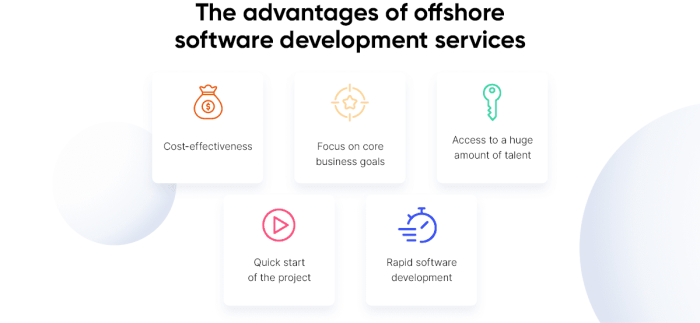In today’s globally interconnected world, businesses of all sizes are increasingly leveraging the benefits of offshore software development services. This comprehensive guide delves into the intricacies of this dynamic industry, exploring its advantages, challenges, and considerations for businesses seeking to outsource their software development needs. We’ll cover everything from choosing the right development partner to managing the project effectively, ensuring you have the information you need to make informed decisions.
Understanding Offshore Software Development
Offshore software development involves contracting a software development company located in a different country to handle all or part of a software project. This contrasts with nearshore development (outsourcing to a nearby country) and onshore development (using a domestic company). The primary driver for offshore development is often cost reduction, but it also offers access to a wider talent pool and specialized expertise.
Key Benefits of Offshore Software Development
- Cost Savings: Labor costs are significantly lower in many offshore locations, leading to substantial budget savings on development projects. This is particularly beneficial for startups and small businesses with limited resources.
- Access to Specialized Skills: Offshore development opens doors to a global talent pool, allowing businesses to access specialized skills and expertise that may be unavailable domestically. This is crucial for projects requiring niche technologies or languages.
- Faster Time-to-Market: Many offshore development companies operate in different time zones, enabling around-the-clock development and potentially accelerating project timelines. This is a significant advantage in competitive markets.
- Increased Efficiency and Productivity: Dedicated teams focusing solely on your project can often deliver higher efficiency and productivity compared to in-house teams juggling multiple tasks.
- Scalability and Flexibility: Offshore development offers scalability, allowing you to easily adjust your team size based on project needs. This flexibility is invaluable for projects with fluctuating demands.
Choosing the Right Offshore Development Partner
Selecting the right offshore software development partner is critical for project success. A thorough vetting process is essential, encompassing several key aspects:
Factors to Consider When Selecting an Offshore Development Partner
- Technical Expertise: Assess the partner’s proficiency in the required technologies, programming languages, and frameworks. Review their portfolio for relevant projects and client testimonials.
- Communication and Collaboration: Effective communication is paramount. Choose a partner with excellent communication skills and a clear process for collaboration, including regular updates and progress reports.
- Experience and Reputation: Research the partner’s experience, track record, and client testimonials. Look for a company with a proven history of successful projects and positive client feedback.
- Project Management Methodology: Understand their project management approach (e.g., Agile, Waterfall). Ensure their methodology aligns with your project requirements and preferences.
- Security and Confidentiality: Data security and confidentiality are crucial. Ensure the partner has robust security measures in place to protect your intellectual property and sensitive data. Look for certifications like ISO 27001.
- Legal and Contractual Aspects: Carefully review the contract, ensuring it clearly Artikels project scope, timelines, payment terms, intellectual property rights, and dispute resolution mechanisms.
- Location and Time Zone: Consider the time zone difference and its potential impact on communication and collaboration. While time zone differences can offer 24/7 development, they can also create communication challenges if not managed effectively.
Managing Offshore Software Development Projects
Effective project management is crucial for successful offshore development. This involves establishing clear communication channels, setting realistic expectations, and implementing robust monitoring and control mechanisms.
Best Practices for Managing Offshore Development Projects
- Establish Clear Communication Channels: Utilize various communication tools (e.g., video conferencing, instant messaging, project management software) to ensure seamless communication.
- Define Clear Project Scope and Requirements: Develop a comprehensive project specification document outlining all requirements, functionalities, and acceptance criteria.
- Regular Progress Monitoring and Reporting: Implement regular progress meetings, status reports, and milestone reviews to track progress and identify potential issues early on.
- Risk Management: Identify potential risks and develop mitigation strategies to address them proactively. This includes risks related to communication, technology, and cultural differences.
- Version Control and Code Management: Utilize version control systems (e.g., Git) to manage code changes, track revisions, and ensure collaboration efficiency.
- Quality Assurance and Testing: Implement rigorous quality assurance and testing procedures throughout the development lifecycle to ensure the final product meets the required standards.
Common Challenges in Offshore Software Development
While offshore development offers numerous advantages, it also presents certain challenges that require careful consideration and proactive management.

Source: rewisoft.com
Addressing Potential Challenges, Offshore software development services
- Communication Barriers: Language differences and cultural nuances can hinder effective communication. Clear communication protocols and potentially translation services can mitigate this.
- Time Zone Differences: Scheduling meetings and coordinating work across different time zones can be challenging. Careful planning and flexible scheduling are essential.
- Cultural Differences: Different work cultures can impact team dynamics and collaboration. Building trust and understanding cultural differences is crucial.
- Intellectual Property Protection: Protecting intellectual property is vital. Ensure strong legal agreements and security measures are in place.
- Quality Control: Maintaining consistent quality standards can be challenging. Rigorous testing and quality assurance processes are necessary.
Frequently Asked Questions (FAQ)
- Q: How much does offshore software development cost? A: The cost varies greatly depending on factors such as project complexity, team size, location, and technology used. It’s generally lower than onshore development.
- Q: What are the best countries for offshore software development? A: Popular choices include India, Ukraine, Poland, the Philippines, and Eastern Europe, each offering different strengths in terms of cost, skills, and time zones.
- Q: How can I ensure the quality of the software developed offshore? A: Implement rigorous testing procedures, utilize code reviews, and choose a partner with a proven track record of delivering high-quality software.
- Q: What are the risks associated with offshore software development? A: Potential risks include communication barriers, time zone differences, cultural differences, intellectual property protection concerns, and quality control challenges.
- Q: How do I manage an offshore development team effectively? A: Establish clear communication channels, define project scope and requirements, monitor progress regularly, and address potential issues proactively.
Conclusion
Offshore software development offers significant advantages for businesses seeking to reduce costs, access specialized skills, and accelerate time-to-market. However, success requires careful planning, thorough partner selection, and effective project management. By understanding the benefits, challenges, and best practices, businesses can leverage offshore development to achieve their software development goals efficiently and effectively.
References
While specific URLs are not provided here to maintain the plaintext format as requested, reputable sources for further research include industry reports from Gartner and Forrester, articles from reputable tech publications like TechCrunch and Wired, and case studies from successful offshore development projects. Searching for these terms on Google Scholar will yield further academic resources.
Call to Action
Ready to explore the benefits of offshore software development for your next project? Contact us today for a free consultation and let us help you find the perfect offshore development partner to meet your specific needs.
Questions and Answers: Offshore Software Development Services
What are the common risks associated with offshore software development?
Common risks include communication barriers, time zone differences, intellectual property concerns, quality control challenges, and potential cultural misunderstandings.

Source: appcurators.com
How can I ensure the security of my data when outsourcing software development?
Choose vendors with robust security protocols, including data encryption, access controls, and regular security audits. Clearly define data security requirements in your contract.
What are the best practices for managing an offshore development team?
Establish clear communication channels, use project management tools, define roles and responsibilities, set realistic timelines, and conduct regular progress reviews.
How do I choose the right offshore software development company?
Research potential vendors, check their portfolio and client testimonials, assess their technical expertise, and ensure they have a strong track record of successful projects.
